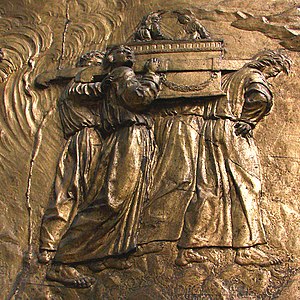 |
| Español: Este es un Gohonzon inscripto por el mismo Nichieren en 1280 para su discipulo Nissho; etse estilo de Gohonzon es llamado Ichinen Sanzen Gohonzon (Photo credit: Wikipedia) |
So now that I've confirmed you read the title correctly, here is a quote from an article by Sandy McIntosh titled "As American As Apple Pie?" that appeared in a 1992 in the Winter 1992 issue of Tricycle magazine:
The liturgy of gongyo encourages one to clear the mind of wishes, anxieties, and other distracting thoughts so that when it is time to chant Nam Myoho Renge Kyo (the most important part of the practice) the mind will be sufficiently stilled to concentrate on the Gohonzon. The goal of this "assiduous practice" is the fusion of one's mind with the reality of the Gohonzon—it means reading the Chinese characters not simply with one's eyes but "with one's life"—through chanting Nam Myoho Renge Kyo.
...
I had friends who started off chanting for cheaper drugs and free money. Like them, I treated the Gohonzon as a pimp. I wanted to see if chanting would work. I set about praying for things (a summer job, a girlfriend, even a good parking spot) that would fill immediate needs or give instant pleasure. Some things I got; others I didn't. The things I really needed-such as better relationships with people and with myself-eluded me. Nevertheless, I continued to chant. Gradually, my interest in shortterm material benefits was displaced by a hunger for longerterm spiritual ones. I found that chanting incessantly about difficult personal problems, like polishing a mirror, brought clarity to my situation. The more difficult or painful the motivation for my chanting, the clearer the mirror of my faith reflected my ownership of whatever troubled me. I could no longer deny the responsibility for my predicaments. In my experience, the activity of chanting for material or spiritual things becomes a process of cleansing one's spirit, not corrupting it; and Buddhists who began by chanting for hotter cars ended up driven to awaken themselves and help others, at times with great energy and joy.This was published not long after the bitter split between Nichiren Shoshu and the Soka Gakkai, so it is relevant to the perspectives of people in both camps at that time. The whole "chanting for stuff" issue has been debated many times in various venues and forums, with the above as an example of a pro-chanting for stuff argument that has been developed and polished over the years. It is akin to petitionary prayer in theism.
The point of similarity I wish to make between that and chanting or singing or just reading the Psalms as prayer early in the Daily or Divine Office is one of clearing the air, getting out what is most distracting you by way of engendering fear, anger, lust, or despair. I think the Psalms, along with prayers for specific personalized petitions, might serve a function similar to what McIntosh and others have described. You pour out your heart to make room the the divine, whether that is conceptualized as God or Buddha-nature or the Buddha-dharma (rendered in Nichiren Shoshu and the Soka Gakkai as the "Mystic Law").
I would not be surprised to find parallels in other forms of Buddhism or in non-Buddhist traditions. I suppose it does make a certain kind of sense. One problem I have with the Psalms though is that they may not really reflect the state I am in and therefore not really act as a way to clarify it. I suppose it could be seen as a way to practice sympathy and solidarity with others, although as I understand it that is not the point of praying them, but really it just makes me bored, sad, irritated, or judgmental.



